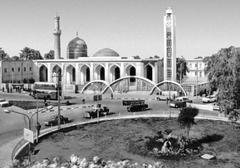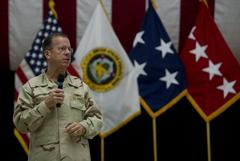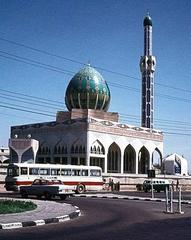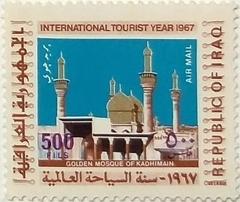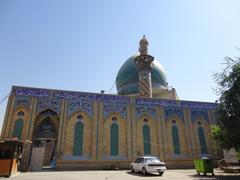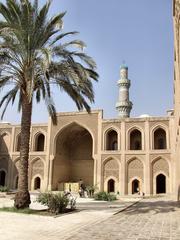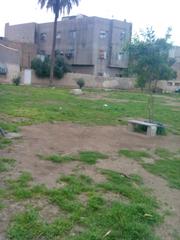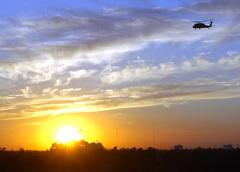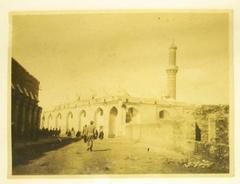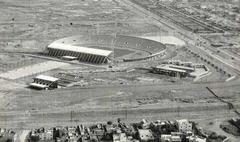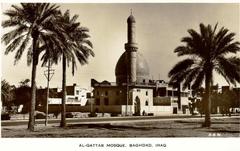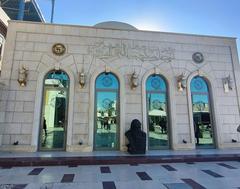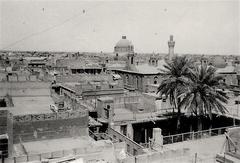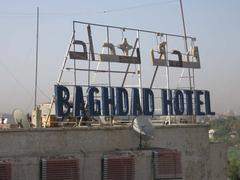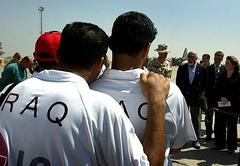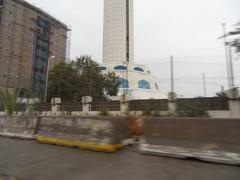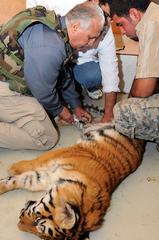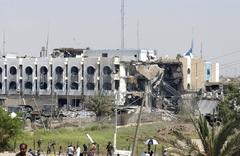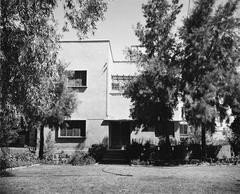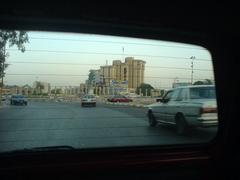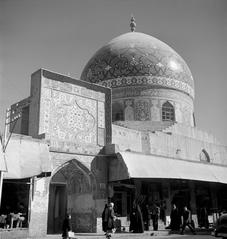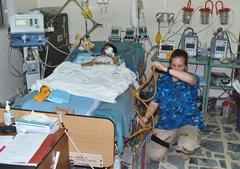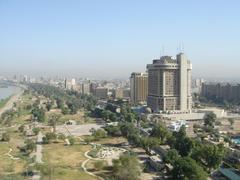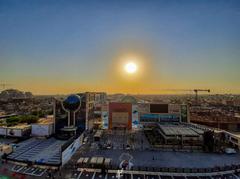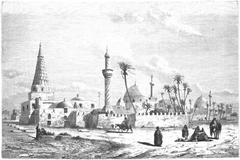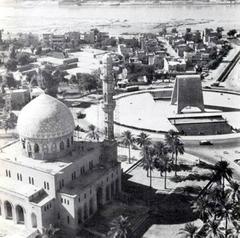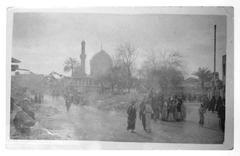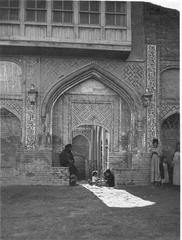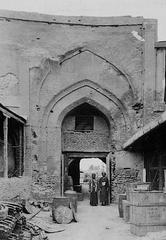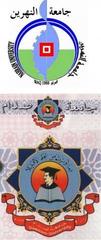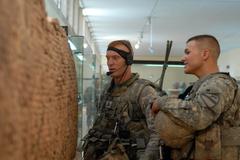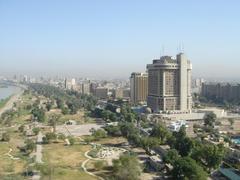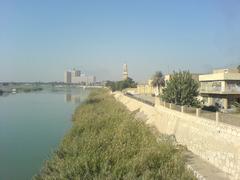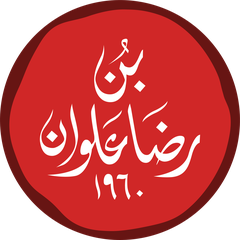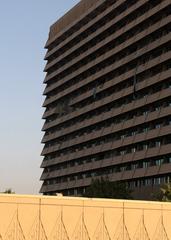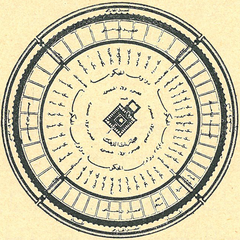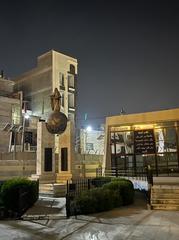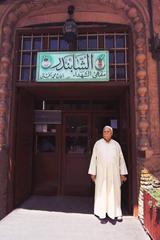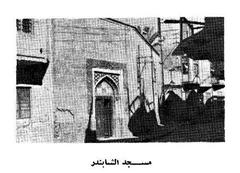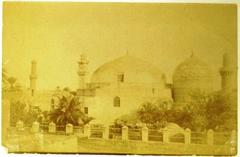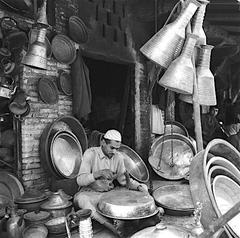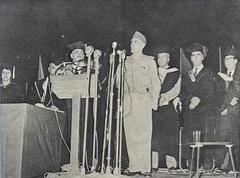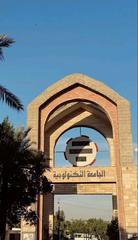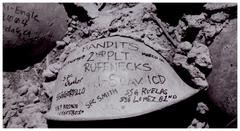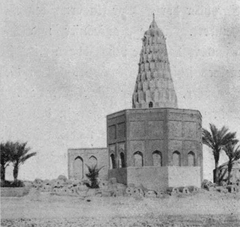Umm al-Tabul Mosque: Visiting Hours, Tickets, and Comprehensive Guide to Baghdad’s Historic Gem
Date: 14/06/2025
Introduction: Exploring Umm al-Tabul Mosque’s Legacy
Umm al-Tabul Mosque (Arabic: جامع أم الطبول, Jami’ Umm al-Tabul) stands as a monumental symbol of Baghdad’s enduring Islamic heritage, architectural excellence, and community resilience. Located in the bustling Yarmouk neighborhood near Baghdad International Airport, the mosque is not only a revered place of worship but also a center for education, social welfare, and cultural continuity. Whether you are a history enthusiast, architecture admirer, or spiritual seeker, this guide offers a detailed overview of the mosque’s significance, visitor information, etiquette, and nearby attractions, ensuring a respectful and enriching experience (muslimheritage.com, globalsecurity.org, Wikipedia).
Historical and Cultural Significance
Origins and Symbolism
Originally constructed to commemorate the officers involved in the 1959 Mosul uprising, Umm al-Tabul Mosque is often referred to as the “Martyr’s Mosque.” This dedication, coupled with its stately architecture, imbues the mosque with deep historic and spiritual meaning within Iraq’s religious landscape (Wikipedia). Its location is significant for both locals and international visitors due to its accessibility and prominence in Baghdad’s urban fabric.
Architectural Heritage
The mosque is a striking example of Baghdad’s layered architectural tradition, blending Abbasid, Ottoman, Persian, and modern influences. Its architectural elements include:
- Grand Golden Dome: Drawing inspiration from the Citadel of Saladin in Cairo, the mosque’s dome is a city landmark, covered in golden tiles.
- Spiral Minarets: These are visible across the skyline and combine Egyptian and Iraqi Islamic styles.
- Intricate Tilework and Calligraphy: The mosque’s ornamentation features arabesques, Quranic inscriptions, and geometric patterns, reflecting centuries of Islamic artistry (Commercial Architecture Magazine, EAA Architecture Guide, mypluralist.com).
The mosque’s layout centers around a spacious courtyard (sahn) and is surrounded by arcaded walkways, a hallmark of classical Islamic design (Commercial Architecture Magazine).
Community Functions and Social Role
Umm al-Tabul Mosque has served as a nucleus for religious, educational, and social activities throughout its history. It has:
- Hosted Quranic schools (madrasas) and provided instruction in Islamic jurisprudence, Arabic, and other subjects (muslimheritage.com).
- Distributed charity (zakat) and provided shelter, especially during crises; by 2016, it housed over 120 displaced families (Wikipedia).
- Fostered community cohesion through events, celebrations, and forums for dialogue and conflict resolution (blog.globalsadaqah.com).
Visitor Information: Hours, Entry, and Accessibility
Visiting Hours
- Regular Hours: Open daily, 7:00 AM – 7:00 PM
- Extended Hours: During Ramadan and major Islamic festivals, hours may be extended.
- Recommendation: Visit outside prayer times for a relaxed experience; Fridays and holidays may see increased attendance.
Entry and Tickets
- Admission: Free for all visitors, in keeping with Islamic tradition.
- Donations: Voluntary contributions are welcome to support maintenance and community services.
Accessibility
- Facilities: Ramps at entrances and accessible restrooms.
- Assistance: Contact the mosque administration for specific needs.
Guided Tours
- Availability: Can be arranged through the mosque or local travel agencies.
- Content: Tours often cover architectural features, historic context, and the mosque’s cultural role.
Dress Code and Etiquette
- Modest Clothing: Men should wear long trousers and sleeved shirts; women should cover hair and wear long skirts or trousers with long sleeves.
- Shoes: Remove before entering prayer areas.
- Behavior: Maintain quiet, avoid crossing in front of worshippers, and respect gender-segregated areas (Learn Religions, Calculated Traveller).
Enhancing Your Visit: Practical Tips and Facilities
Travel Tips
- Language: Arabic is the main language; basic phrases are appreciated. English is limited outside tourist areas.
- Photography: Permitted with discretion; avoid flash and never photograph worshippers without consent.
- Facilities: Basic ablution areas and restrooms; bring tissues and bottled water.
Safety and Security
- Security Environment: Baghdad’s situation has improved, but check current travel advisories.
- On Site: Expect security checks; carry ID and minimize valuables.
- Personal Safety: Travel with a guide, especially at night; use reputable transportation providers.
Health and Hygiene
- Water: Drink only bottled or boiled water.
- Food: Be cautious with street food; bring snacks if needed.
- First Aid: Carry essentials and ensure vaccinations are up to date.
Nearby Attractions in Baghdad
After visiting Umm al-Tabul Mosque, consider these nearby historical and cultural sites:
- Al-Kadhimain Mosque: One of Iraq’s most important Shia shrines.
- Al-Mustansiriya School: A medieval Islamic educational institution.
- Abbasid Palace Ruins: Remnants of Baghdad’s golden age.
- National Museum of Iraq: Extensive collections of Mesopotamian artifacts.
- Al-Mutanabbi Street: Famous for its book market and literary history (fanack.com, wildtrips.net).
Community Impact and Modern Role
- Humanitarian Center: The mosque has sheltered displaced families during Iraq’s recent conflicts, highlighting its ongoing social and humanitarian importance (Wikipedia).
- Cultural Hub: Home to a unique library and venue for cultural events and interfaith dialogue.
- Urban Identity: Integral to Baghdad’s urban life, supporting local businesses and fostering a sense of community (EAA Architecture Guide).
Frequently Asked Questions (FAQ)
Q: What are Umm al-Tabul Mosque’s visiting hours?
A: 7:00 AM – 7:00 PM daily, with possible variations during religious festivals.
Q: Is there an entry fee or ticket required?
A: No; admission is free, though donations are appreciated.
Q: Are non-Muslims allowed to visit?
A: Yes, outside prayer times and with respect for mosque etiquette.
Q: Are guided tours available?
A: Yes; arrange through local agencies or the mosque office.
Q: Is the mosque accessible for people with disabilities?
A: Yes; ramps and accessible facilities are available.
Conclusion: Embracing Baghdad’s Spiritual and Cultural Heritage
Umm al-Tabul Mosque is more than a place of prayer—it is a beacon of faith, history, and community in Baghdad. Its architectural beauty and social contributions make it a must-visit landmark for those seeking a deeper understanding of Iraq’s past and present. To ensure a meaningful visit, follow respectful protocols, explore neighboring sites, and consider using guides for a richer experience.
Plan your visit today, and for updates, guided tours, and cultural insights, download the Audiala app and follow our social channels.
Sources and Further Reading
- Education in Islam: The Role of the Mosque, Muslim Heritage
- Baghdad Mosques Overview, GlobalSecurity.org
- Baghdad’s Urban Fabric Transformation: A Historical Analysis, Fanack
- The Role of Mosques in Community Development, Global Sadaqah Blog
- Visiting Umm al-Tabul Mosque, Wikipedia
- 10 Best Architectural Buildings in Baghdad, EAA Architecture Guide
- Walls of Baghdad: A Spiritual and Cultural Exploration, Adeeba Tour & Travels
- Rise and Fall of Baghdad, MyPluralist
- Mosque Architecture, Commercial Architecture Magazine
- Etiquette of Visiting a Mosque, Learn Religions
- Travel Tips While Visiting a Mosque, Calculated Traveller
